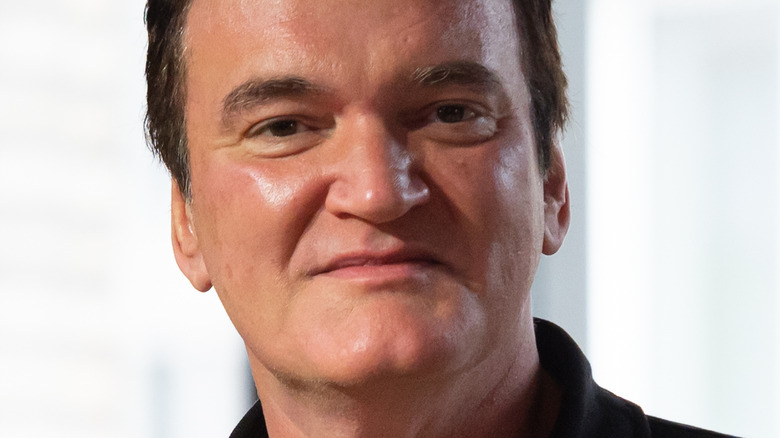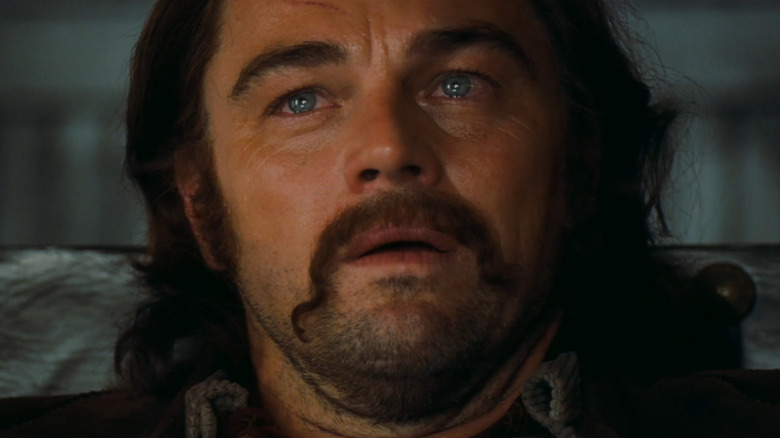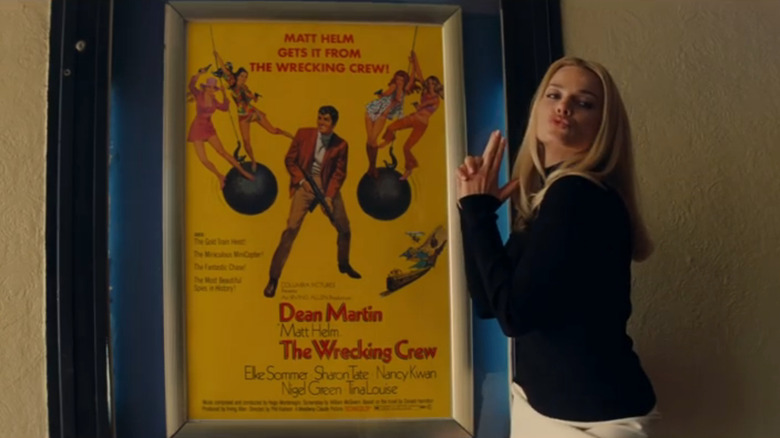Quentin Tarantino Finally Lands On Once Upon A Time In Hollywood As His Best Movie
With three decades of filmmaking under his belt, Quentin Tarantino is one of the foremost auteurs of his generation. His filmography is full of rarely disputed classics like "Pulp Fiction" and "Inglourious Basterds," and his material is known as much for its genre-bending as it is for his penchant for hyperviolence and, of course, his predilection for close-up shots of people's feet. His films have garnered Academy Awards and drawn reactionary backlash in equal measure, but what's undeniable is that each one is the product of a singularly unique mind. A Tarantino movie stands out in a lineup because they're movies no one else could possibly have made.
Tarantino has always been vocal about his opinions. Whether he's deriding the MCU or ranking "Star Trek" over "Star Wars", he's not afraid of rocking the boat. However, when it comes to his own work, he's been reticent to pick a favorite movie from his catalog. Lately, though, Tarantino has stepped away from the camera and turned to the page. He published a novelization of his last film, 2019's "Once Upon a Time in Hollywood," and now he's on a press tour promoting his nonfiction volume, "Cinema Speculation." Recently, Tarantino visited The Howard Stern Show for a wide-ranging interview during which he finally named which of his films he likes best. Perhaps unsurprisingly, "Once Upon a Time in Hollywood" is Tarantino's pick for his best movie.
Tarantino doesn't think he's made a better movie than Once Upon a Time in Hollywood
When asked by Howard Stern whether he could pick a favorite movie from his filmography, Quentin Tarantino was surprisingly straightforward, naming "Once Upon a Time in Hollywood" as his best. After a bit of preamble, the director said at around 1:47:00 of his appearance, "I really do think 'Once Upon a Time in Hollywood' is my best movie."
Starring Leonardo DiCaprio and Brad Pitt respectively as actor Rick Dalton and his stunt double Cliff Booth, "Once Upon a Time in Hollywood" opened in 2019 to mostly positive critical reception. Set during the heyday of Hollywood during the late 1960s, when Westerns were in vogue and Bruce Lee was in his prime, the movie has been described as an ode to a version of the film industry that is no more. However, the real flourish on top of the proceedings comes with Tarantino's decision to center the events of the film around the infamous Tate-LaBianca murders committed by Charles Manson's followers.
Margot Robbie takes on the role of Sharon Tate, the young starlet murdered on that fateful day in 1969. But in line with the director's previous historical revisionisms, the movie climaxes with Dalton and Booth, who never existed in real life, inadvertently saving the day. Tarantino holds back on his usual tendencies toward graphic violence until that linchpin scene, then lets it erupt in truly stunning fashion as the Manson Family members are taken out with a dog, fists, and a flamethrower.
Overall, it's a weird and wild movie that doesn't seem to care about audience sensibilities, and it's branded with Tarantino's signature stylistic flourishes from front to back. It's easy to see why the director would think it's his best work.
Not everyone loves Once Upon a Time in Hollywood as much as Tarantino
Some, such as this publication, have placed "Once Upon a Time in Hollywood" toward the middle of the pack when it comes to ranking Tarantino's filmography, but it's easy to see why it's the director's favorite. It will be obvious to anyone watching that Tarantino was given total leeway. The plot meanders through deviations and digressions, cycles back on itself recursively, and, because this is a Tarantino film, the camera fixates on its stars' feet for uncomfortable amounts of time. It is, in the truest sense, a work of auteur filmmaking. Yes, that means the movie is uneven and sometimes flawed, but it also means those flaws are a deliberate expression of Tarantino's artistic vision. They are interesting flaws that lend the film its texture and personality. As Rolling Stone's Peter Travers wrote in his review, "You can feel Tarantino's mad love for movies in all their disreputable dazzle and subversive art in every shot."
However, other outlets, such as The Guardian, felt that "Once Upon a Time in Hollywood" ceded a bit too much ground to Tarantino's personal fears and hang-ups. Critic Wendy Ide noted that some of the film's choices, like Booth's alleged history of violence toward women getting mentioned offhand, feel like a jab at the #MeToo movement, while the story of two actors on a career decline can easily be read as Tarantino's own fear of losing relevance after so much time in the sun. Still, the reviewer acknowledges that the movie is clearly the product of a singular vision, writing, "It's a film that could only have been made by one man."
Ultimately, "Once Upon a Time in Hollywood" might be the most Tarantino movie yet. And for the venerated filmmaker himself, that's an achievement worth celebrating.


